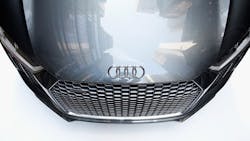VW Scandal Spreading to Audi Threatens Carmaker’s Cash Cow
Volkswagen AG’s attempts to contain the fallout from the emissions cheating suffered a setback after Audi, the group’s biggest profit center, lost a key engineer tainted by the scandal.
Development chief Stefan Knirsch left the manufacturer with immediate effect this week after a probe showed he was aware of the manipulation when he took the job less than 10 months ago. A company veteran who started in Audi’s engine design unit in 1990, Knirsch was picked by Audi Chief Rupert Stadler to succeed Ulrich Hackenberg, who was pushed out in the first round of management purges after the scandal broke a year ago. Now Stadler himself has come under increased scrutiny as investigators seek to untangle the origins of the scandal.
“We made it clear from the start that we don’t spare big names in the probe and will act if it becomes necessary,” Berthold Huber, deputy chairman of the unit’s supervisory board, said in a statement about Knirsch’s departure. Audi didn’t comment on the reasons for the executive’s abrupt exit.
Audi is a linchpin in the Volkswagen (IW 1000/8) structure. In addition to providing the biggest share of profit, it’s an incubator for technology that filters down to the group’s mass-market brands and a proving ground for executives. Former Chief Executive Officer Martin Winterkorn ran Audi before being promoted to VW’s top job, following the same path as former Chairman Ferdinand Piech. That close-knit relationship has raised questions about the responsibility for the cheating, and if Audi with its deep technology know-how played an integral role.
Volkswagen shares dropped 4.5% to 111 euros at 12:00 p.m. in Frankfurt. The stock has tumbled 31% since the cheating became public, valuing the company at 59.2 billion euros (US$66.6 billion).
Audi has already been implicated in the yearlong drama, albeit on a fairly marginal scale. Aside from the rigging of smaller Volkswagen diesel engines, U.S. authorities targeted Audi for developing bigger motors that don’t comply with diesel regulations. The manufacturer initially rejected the allegations before backtracking. Fixing that issue, encompassing about 85,000 vehicles, remains unresolved even after a settlement for the smaller cars.
Audi has become a focal point in the past week of media coverage tracing the scandal. A report in Der Spiegel linked Stadler to the crisis, and another alleged that some executives at the brand were aware of the cheating for almost a decade. The Audi CEO, who has run the brand for close to a decade and was part of Winterkorn’s inner circle, fired back, telling the Rheinische Post newspaper this weekend that’s he’s helping the investigation
Subcompacts to Supercars
Stadler, 53, has been instrumental in raising the cachet of the brand, from an also-ran manufacturer in the 1980s to a carmaker that aspired to take the luxury-car crown by the end of this decade. Audi’s range spans the A1 subcompact that rivals with the Mini hatchback to the R8 supercar that shares parts with Lamborghini, the Italian sports-car maker owned by Audi. The A8 flagship competes with the Mercedes-Benz S-Class and BMW 7 series.
The engine-control software at the heart of the cheating scandal dates back to the late 1990s when Audi engineers developed a feature to reduce noise from diesel engines but at the same time elevated emissions. To determine who will be held accountable for the manipulation, investigators are trying to understand when exactly VW engineers refined that code and turned into a defeat device
Amid a tight battle with its luxury-car rivals, Audi can ill afford the distraction of losing its second development chief in less than a year. With a lack of leadership, the brand threatens to lose a step in developing technology to woo new customers. Mercedes and BMW have both posted bigger gains in deliveries so far this year, entrenching Audi’s lagging position in the three-way race for the No. 1 post in premium-car sales.
“The consequences of this degree of management distraction won’t be visible for a number of years,” said Willi Diez, who heads up the Institute for Automotive Economics in Geislingen, Germany. “We don’t see any immediate impact on sales volumes, but at some point the products will probably suffer.”
For the time being, much of the attention at Audi is on VW’s internal probe. Lawyers handling the investigation have spoken to company insiders who pointed fingers at Stadler, alleging the CEO knew about the engine manipulation since 2010, Der Spiegel reported Sept. 20. The next day, Sueddeutsche Zeitung said the investigators had discovered e-mail correspondence dating back to 2007 from an Audi engineer, who had told a wider group of managers that complying with U.S. nitrogen-oxide thresholds wouldn’t be entirely possible without cheating.
Volkswagen Stabilizer
Stadler, who is also a member of the Volkswagen management board, was questioned Sept. 21 by lawyers from Jones Day, the law firm hired by the carmaker to help investigate the cheating, people familiar with the matter said. Members of the supervisory board were briefed on the status of the investigation Friday and for now are satisfied with the explanation they received regarding Stadler’s role in the scandal, said the people, who asked not to be identified because the discussions were private.
The public furor over Audi come as the unit ramps up a North American expansion. On Friday, the brand opens its first factory in the region, which will produce an overhauled version of the Q5 sport utility vehicle in San Jose Chiapa, Mexico.
“Audi stabilizes the Volkswagen group with its profits,” said Stefan Bratzel, director of the Center of Automotive Management at the University of Applied Sciences in Bergisch Gladbach, Germany. “Audi can’t be allowed to wobble.”
By Christoph Rauwald and Chad Thomas
About the Author
Bloomberg
Licensed content from Bloomberg, copyright 2016.
